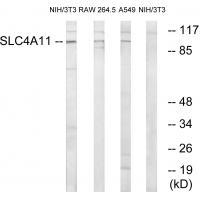
| WB | 咨询技术 | Human,Mouse,Rat |
| IF | 咨询技术 | Human,Mouse,Rat |
| IHC | 咨询技术 | Human,Mouse,Rat |
| ICC | 技术咨询 | Human,Mouse,Rat |
| FCM | 咨询技术 | Human,Mouse,Rat |
| Elisa | 咨询技术 | Human,Mouse,Rat |
| Aliases | BTR1; CDPD; CHED2; NABC1; SLC4A11 |
| Entrez GeneID | 83959; |
| WB Predicted band size | 100kDa |
| Host/Isotype | Rabbit IgG |
| Antibody Type | Primary antibody |
| Storage | Store at 4°C short term. Aliquot and store at -20°C long term. Avoid freeze/thaw cycles. |
| Species Reactivity | Human,Mouse |
| Immunogen | Synthesized peptide derived from internal of human SLC4A11. |
| Formulation | Purified antibody in PBS with 0.05% sodium azide. |
+ +
以下是关于SLC4A11抗体的3篇参考文献的简要信息:
---
1. **文献名称**:Mutations in SLC4A11 Cause Autosomal Recessive Congenital Hereditary Endothelial Dystrophy
**作者**:Vithana EN, et al.
**摘要**:该研究通过基因测序和免疫组织化学分析,发现SLC4A11基因突变导致角膜内皮细胞中该蛋白表达缺失,从而引发先天性角膜内皮营养不良。研究中利用SLC4A11抗体在患者角膜样本中证实了蛋白表达的异常。
2. **文献名称**:SLC4A11 is a pH-regulated anion transporter in corneal endothelial cells
**作者**:Park M, Li J, et al.
**摘要**:文章通过Western blot和免疫荧光技术,使用SLC4A11抗体验证了该蛋白在角膜内皮细胞膜上的定位,并证明其作为pH敏感阴离子转运体的功能,揭示了其在维持角膜透明度中的关键作用。
3. **文献名称**:Functional characterization of SLC4A11 mutations associated with corneal dystrophies
**作者**:Zhang W, et al.
**摘要**:本研究通过构建SLC4A11突变体,结合抗体介导的蛋白检测技术,发现特定突变导致蛋白错误折叠和细胞内滞留,阐明了突变影响转运功能并引发角膜病变的分子机制。
---
以上文献均涉及SLC4A11抗体的应用,涵盖疾病关联、蛋白定位及功能机制研究。
**Background of SLC4A11 Antibody**
The SLC4A11 gene encodes a member of the solute carrier family 4 (SLC4), which functions as a borate transporter or an electrogenic Na⁺-coupled OH⁻/H⁺ transporter. Primarily expressed in corneal endothelial cells, kidneys, and the inner ear, SLC4A11 plays a critical role in regulating pH homeostasis, fluid transport, and cell volume. Mutations in SLC4A11 are linked to congenital hereditary endothelial dystrophy (CHED), Harboyan syndrome (corneal dystrophy with hearing loss), and some forms of Fuchs endothelial corneal dystrophy (FECD).
SLC4A11 antibodies are essential tools for studying the protein's expression, localization, and functional mechanisms in physiological and pathological contexts. These antibodies enable detection via techniques like Western blotting, immunohistochemistry, and immunofluorescence, aiding in the diagnosis and research of SLC4A11-associated disorders. Monoclonal and polyclonal variants are available, often validated for specificity using knockout cell lines or tissues.
Recent studies also explore SLC4A11's role in cellular metabolism, including its interaction with ammonia transporters and involvement in glucose metabolism, suggesting broader implications beyond corneal and auditory health. Additionally, SLC4A11 antibodies contribute to investigating its potential role in cancer, where altered expression may influence tumor microenvironments. Ongoing research aims to clarify its transport mechanisms and therapeutic potential, emphasizing the antibody's utility in bridging molecular insights with clinical applications.
×